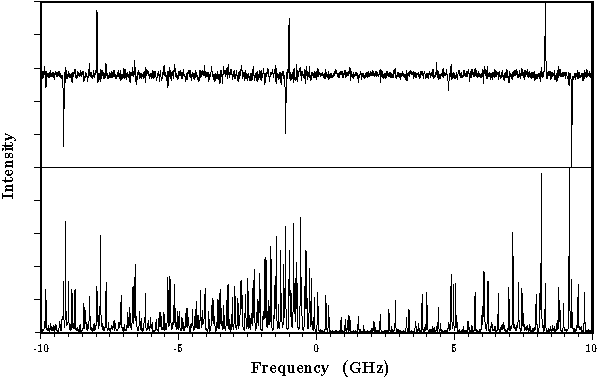
Keywords: structure of cyanonaphthalene and its complex with triethylamine. Changes in structure upon electronic excitation. Electronic, vibrational and rotational spectroscopy. Also for aminonaphthalene.
The rotationally resolved fluorescence excitation spectrum of the 0-0
band in the S1 <-- S0 transition of 1-cyanonaphthalene (CNN), at 318
nm, has been recorded using laser induced fluorescence in a molecular
beam apparatus. This band exhibits pure a-type character and consists
of about 600 lines at a rotational temperature of 2.5 K, each with a
linewidth of 17 MHz. A microwave-ultraviolet double resonance experiment
on the 0-0 band of CNN has been performed to verify the rotational
assignments of the fluorescence excitation spectrum and to obtain more
accurate rotational constants in both the ground and electronically
excited states. The band origin is at 31411.114 ±0.003 cm-1 and
the rotational constants are (in MHz) A''=1478.65(2), B''=956.75(1),
C''=580.989(7), A'-A''=-21.363(9), B'-B''=-13.305(5), and
C'-C''=-8.167(2). (more..)

The rotationally resolved fluorescence excitation spectrum of the 0-0 band in the S1 <-- S0 transition, at 318 nm, of the 1-cyanonaphthalene/triethylamine van der Waals complex has been recorded using laser induced fluorescence in a molecular beam apparatus. This spectrum could be fitted to a pure a-type band. From the rotational constants a T-shaped geometry could be deduced.
The high resolution fluorescence excitation spectrum of the origin band of the S1 <-- S0 transition of 1-aminonaphthalene (1AN) has been recorded. It was found that this band is predominantly b-axis polarized, in contrast with other (previously measured) 1-substituted naphthalenes, which are a-axis polarized. Thirteen vibronic bands of 1AN were also examined at high resolution. The rotational constants, the inertial defects, and the band polarizations vary significantly from band to band. Similar experiments have been performed on eight deuterated isotopomers. A comparison of the results obtained for these isotopomers with those of the corresponding bands in protonated 1AN makes possible the determination of the center-of-mass coordinates of the amino hydrogen atoms. In the zero point vibrational level (ZPL) of the S0 state, the out-of-plane positions of the amino hydrogens are inequivalent; the `inside' hydrogen is located 0.49(8) Angstrom out-of-plane, the `outside' hydrogen only 0.24(17) Angstrom. In the ZPL of the S1 state, 1AN is quasi-planar.
These articles may be downloaded for personal use only. Any other use requires
prior permission of the author and the publisher.
Spectroscopy of cyanonaphthalene / Giel Berden / 2025
Counts since 19/4/2006: